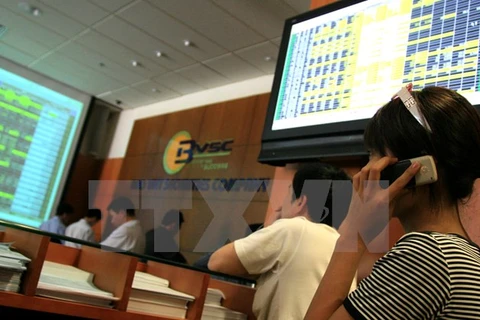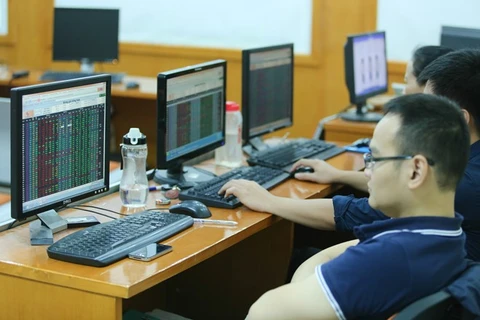HCM City (VNA) – The derivatives market proved its attractiveness when the value of transactions in this market rose threefold in April, when the stock market posted a downward trend, according to the Saigon Securities Inc. (SSI).
An SSI financial and monetary report released on May 9 shows that since the outset of 2018, the stock market experienced two downward periods in February and April, when the liquidity of derivatives grew strongly.
The value of transactions in the derivatives market increased by three times from the average of over 2 trillion VND (87.7 million USD) in the beginning of April to 6 trillion VND (263.1 million USD) at the end of the month. It peaked at 7.1 trillion VND (311.3 million USD) on May 3, approximating the total transaction value of 7.3 trillion VND (320.1 million USD) in the stock market.
The derivatives market attracted a considerable amount of capital from the stock market, mainly from domestic investors.
SSI said Vietnam’s securities market witnessed a series of widespread nosedives when the number of codes with declines doubling those with increases. All groups of key shares fell sharply, causing a psychological pressure on the overall market.
The benchmark VN Index surged in the first quarter of 2018 to set a record of 1,204.33 points on April 9, up 220 points or 22.4 percent from the end of last year and 49 percent in six months.
However, the market reported continuous plunge since then when VN Index dropped to 1,050.26 points in late April, losing 154 points or 12.8 percent of the new record. Total market capitalisation decreased by 20 billion USD to 173 billion USD in the HCM Stock Exchange (HOSE), the Hanoi Stock Exchange (HNX) and the Unlisted Public Company Market (UPCoM).
Foreign investors were net buyers last month, which was attributable to a tumble in the global stock market in February, changes in the world interest rates when the administration of US President Donald Trump took drastic actions to protect US businesses, the possibility of an interest rate hike by FED sooner than expected, and the risk of a widespread trade war.
That more large-cap stocks carried out IPOs and were listed in the market might also have led to foreign funds’ restructuring of their investment items, according to SSI.-VNA
An SSI financial and monetary report released on May 9 shows that since the outset of 2018, the stock market experienced two downward periods in February and April, when the liquidity of derivatives grew strongly.
The value of transactions in the derivatives market increased by three times from the average of over 2 trillion VND (87.7 million USD) in the beginning of April to 6 trillion VND (263.1 million USD) at the end of the month. It peaked at 7.1 trillion VND (311.3 million USD) on May 3, approximating the total transaction value of 7.3 trillion VND (320.1 million USD) in the stock market.
The derivatives market attracted a considerable amount of capital from the stock market, mainly from domestic investors.
SSI said Vietnam’s securities market witnessed a series of widespread nosedives when the number of codes with declines doubling those with increases. All groups of key shares fell sharply, causing a psychological pressure on the overall market.
The benchmark VN Index surged in the first quarter of 2018 to set a record of 1,204.33 points on April 9, up 220 points or 22.4 percent from the end of last year and 49 percent in six months.
However, the market reported continuous plunge since then when VN Index dropped to 1,050.26 points in late April, losing 154 points or 12.8 percent of the new record. Total market capitalisation decreased by 20 billion USD to 173 billion USD in the HCM Stock Exchange (HOSE), the Hanoi Stock Exchange (HNX) and the Unlisted Public Company Market (UPCoM).
Foreign investors were net buyers last month, which was attributable to a tumble in the global stock market in February, changes in the world interest rates when the administration of US President Donald Trump took drastic actions to protect US businesses, the possibility of an interest rate hike by FED sooner than expected, and the risk of a widespread trade war.
That more large-cap stocks carried out IPOs and were listed in the market might also have led to foreign funds’ restructuring of their investment items, according to SSI.-VNA
VNA
























